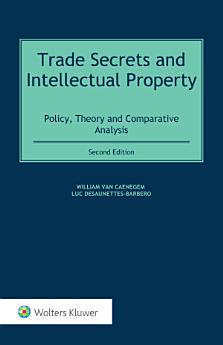Trade Secrets and Intellectual Property: Policy, Theory and Comparative Analysis, Edition 2
About this ebook
Opting for a comparative and critical approach, this book proposes a nuanced analysis of:
the competing theories that underlie trade secrets law, its theoretical justifications, and the varied doctrinal approaches found around the globe;
the law in the US, the UK, France and Germany and the new EU Trade Secrets Directive;
statute laws, international instruments, recent court decisions, and works of notable scholars in the field;
topics such as the competition for control over knowledge between employees and employers; the growth of industrial espionage, country rivalry and third-party liability; the extent and precise parameters of criminal liability; and the policy implications of excessive restrictions on the transfer of employee knowledge and know-how.
This book provides a clear understanding of this multifaceted area of law which is often a fallback or last resort when commercial dealings and relationships go wrong. The authors’ analysis of the underlying policy goals and theoretical dimension of the legal status of trade secrets, including choices in relation to the application of criminal law and concepts of property, will prove of enormous value to academics, policymakers, and corporate counsel.




